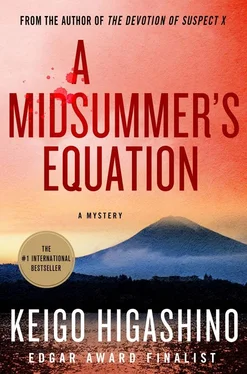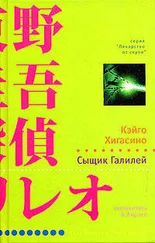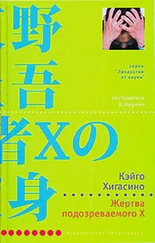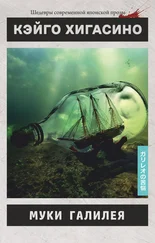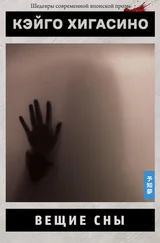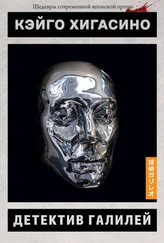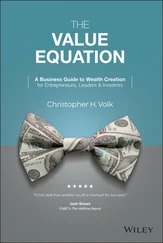He accepted lightly, never questioning her motives. He even thought it might be fun to remember the good old days. They ate dinner, then went to their old hangout, Bar Calvin. Nobuko had always been good at getting men to talk, and after two or three glasses, Senba had pretty much told his entire life story. He watched as she went from interest to disappointment, right around the part where he made it clear he was no longer the high-roller she once knew. As though she couldn’t already tell from the clothes he was wearing. Senba realized she’d been hoping to borrow money.
It was then that he made the mistake he would regret for the rest of his life. He pulled out his wallet to buy some smokes, and the photograph fell out — the picture of Setsuko’s baby. Nobuko picked it up and asked him who it was.
He told her it was a friend’s child, but his words didn’t sound convincing even to him. Setsuko’s face wasn’t visible in the photo, but when Nobuko said she remembered the foliage-patterned kimono the woman was wearing, Senba stiffened in his chair and fell silent.
She asked him to tell her the truth, promising she wouldn’t tell a soul. Senba feared she would make assumptions anyway and spread the word around if he said nothing, so he told her on the condition she keep her promise. As he talked, he felt her warming to him, and this put him at ease. Maybe, he thought, she was a friend after all. Maybe he could trust her to keep his secret.
When he had finished, Nobuko told him to hold on a moment, and she left the table. When she returned after a few minutes, she placed a piece of paper with an address and a phone number on the table in front of him.
She told him that was where Setsuko was living. She had called Haruhi and pretended to be one of Setsuko’s nightclub friends to get the information.
Nobuko suggested he go see her. Surely she wouldn’t mind a single meeting. But Senba shook his head. There was no need. He’d put all of that away for good and had no intention of dragging it back out now. But even as he said it, tears came to his eyes.
As it turned out, Nobuko had another reason for looking up Setsuko’s address.
Two days later, he saw on the morning news that she’d been killed. When he learned where it had happened, the blood drained from his face. After going back and forth on it for hours, he called Setsuko, half worried he might already be too late. In his heart he was already sure she’d stabbed Nobuko. But when she answered the phone, he was relieved to hear her sounding calm. She was a little surprised when he told her who he was, but she didn’t sound unhappy to hear from him. Senba explained what had happened the other night and why he had called. Halfway through his explanation, Setsuko sounded noticeably disturbed. She hadn’t seen her daughter yet that morning, she told him.
She said she should go check on her, so Senba hung up and waited by the phone for a terrifyingly long time. Anxiety rose in him until he felt nauseated, and he couldn’t sit still. When Setsuko finally returned his call, her voice was filled with despair. Her daughter had killed Nobuko, she said through tears. The bloodied knife was still on the table in her room.
Senba made up his mind about what he was going to do. He told her to bring him the knife. Setsuko sounded hesitant, but they chose a place and a time, and he hung up.
He looked around his apartment. There was nothing he worried about losing, with one exception. He bundled up the painting of the sea his wife had made in her last days and, tucking it under his arm, he left.
Setsuko was there when he arrived at their rendezvous point. From the way she acted, he guessed she’d already figured out his plan. She told him she wasn’t sure she was doing the right thing, but he told her that as a mother, protecting her daughter had to be the right thing.
He gave her the painting in exchange for the knife, and asked her to keep it for him until the day came when they might meet again. As he was about to leave, Setsuko told him to look at the café across the street. He did so and saw a slender girl with long black hair sitting at the table by the window. To his astonishment, she looked almost identical to the sister he’d lost to illness when she was young.
He thanked Setsuko. Seeing his daughter was the one thing he felt he needed to do. Now he would have no regrets.
Senba pulled out a small bag containing several photographs from beneath his pillow. He took out one, the photo of the baby, and compared it to the girl in the photo the physicist had given him. He could still see the baby there in her grown features. He wondered what kind of woman she was. He wondered what her voice sounded like. He would have liked to meet her once again before he died, but he knew that would never happen. He couldn’t allow it to. If he did, then all he had endured would be for nothing.
His mind traveled back again to sixteen years earlier, to himself, standing in his old apartment in Tokyo’s Edogawa Ward. The police would be arriving any moment. Once they had identified Nobuko’s body, it would only be a matter of time before they tracked him down as the man who’d shared a drink with her the night before.
The detective came, a tough-looking man. Senba refused to let him inside, hoping to draw his suspicion. The detective left, but Senba knew he would be lingering in the area, keeping an eye on the apartment. Senba waited a while and then headed out, carrying a bag with the knife he’d taken from Setsuko.
He walked to a nearby river, and began to look around suspiciously — an act for the benefit of the detective following him. It worked. The detective came running down the bank toward him.
Senba ran, going as fast as he could, making an honest attempt at escape. For a moment, he feared he might actually succeed, but the detective’s stamina had him beat. He was grabbed from behind and thrown on the ground.
Senba was arrested, put on trial, and declared guilty. And no point did anyone doubt his testimony — save one man, Tsukahara, the arresting detective. Tsukahara wanted to know why he hadn’t thrown the bag into the river when he had a chance. He’d run along the waterway and could’ve tossed the bag in at any time. They might’ve found the bag later, of course, but it would’ve bought him some time. As it was, with the knife in his possession, he’d been arrested for suspicion of murder on the spot.
Senba claimed that tossing the knife hadn’t occurred to him. He’d been so intent on escape that he’d forgotten the knife was in the bag. Tsukahara never seem satisfied with his answer, but Senba didn’t change his story.
Life in prison wasn’t easy. But it gave him strength to know that, because he was here, his daughter could live normally. It gave his own life meaning. When he got out, he called on a friend he’d made while serving his sentence. The man got him a job as a waste collector. The salary was pitifully low, and he was forced to live in a tiny, dirty room, but he was happy enough just to be alive.
Yet even this meager happiness didn’t last long. The man who had gotten him his job ran off with the company’s money. The waste collection service shut down, leaving Senba without a job or even a room to call his own. After that, he was forced to live on the streets. He knew where some homeless people lived, so he turned to them for help. They were kind to him, teaching him everything he needed to know to live outside the framework of society.
He was just getting used to his new life when a new challenge arose. He started finding it difficult to move his arms and legs the way he wanted them to move, and he was afflicted with terrible headaches that kept him from sleeping. Some days, he found it impossible to talk. He stopped being able to go to the soup kitchens he had come to rely on for food. He knew he was sick, very sick. His homeless friends took care of him, but he showed no sign of improvement.
Читать дальше
